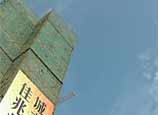
"We have gone to the factory many times during the past two months but didn't find any violations."
A worker at the plant who did not want to be identified said it halted production about a week ago. Police have blocked entry to the plant.
It should be the best season for selling meat slices, as people in Northeast China like eating hotpot during the four-month winter.
However, Huang Xinghua's business has dropped sharply in the past two days.
"I used to sell 50 kg of mutton slices a day but I've only sold about 20 kg today," said the market trader.
Li Chenquan, who runs a hotpot restaurant in Shenyang, said he knew that most of the sliced mutton used in the industry was not real mutton.
"It's a well-known secret in the industry. Real mutton is too expensive. We can't earn money if we use genuine meat," said Li, who has lost around 20 percent of his customers since the scandal broke.
As of Monday, provincial authorities had received no reports of people being poisoned by the fake meat.
"It is unlikely that these tainted meat products have found their way to Beijing since the city's major suppliers of mutton and beef are in Shanxi, Shandong, and Inner Mongolia," said Liu Tong, director of statistics at Xinfadi, a major wholesale center for agricultural produce in Beijing.


















 The journey is more important than the destination:Three people who opted for an adventure tell stories.
The journey is more important than the destination:Three people who opted for an adventure tell stories.


![]()
